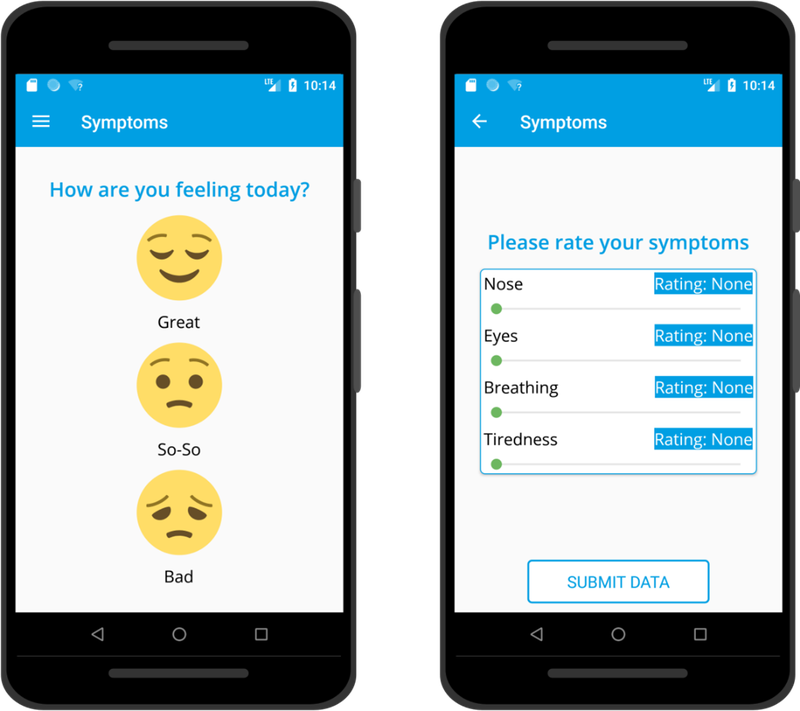Research Software Engineers Ann Gledson, Douglas Lowe, Joshua Woodcock and Adrian Harwood have recently been named as co-authors on a Nature Scientific Reports paper which demonstrates that people living in urban areas report significantly worse hay fever symptoms than those living in rural locations. This is the first study to compare pollution levels with the severity and duration of real-time symptoms.
The data for the paper was gathered through a citizen science mobile application called Britain Breathing, created by our Research Software Engineering team, that allowed the quick and easy collection of 36,145 symptom reports submitted over 5 years – from 2016 to 2020 - by over 700 Britons.
Once the Britain Breathing data was collected, Doug and Ann began the collection of environmental data, data pre-processing and data analysis. This work was made much easier using our Computational Shared Facility which was used for speeding up the process of identifying postcodes from geographical co-ordinates as well as running the regional EMEP air quality model to supplement the pollution measurements. It was soon discovered that looking for relationships between environment and allergy symptoms was highly complex, potentially due to issues such as:
- data sparsity,
- time-lags between environment changes and people experiencing reactions,
- the complexity of chemical interactions within the atmosphere and
- the variety of human immune responses to the different pollens and pollutants.
They therefore decided to explore the differences between urban and rural symptom reports as these two location types are reported to vary in pollen counts and types, pollution levels, rates of allergic reactions and daily mortality rates, and with this simpler dichotomy, they were able to detect significant differences between the two participant cohorts within these areas.
The App
The Britain Breathing app recorded the severity of three symptoms: runny nose, sore eyes and wheezy breathing. At the time that the user installs the application, they are asked for basic demographics such as gender, age and ‘do you have hay fever?’. Participants are asked to report their symptoms each day for each of the 3 symptoms, using a simple sliding scale widget, designed to allow easy selection of one of the available 4 (0 to 3) scores and whether they have taken allergy medication that day (see Figure 1). Each time the user inputs their scores, they are sent to a central server and recorded along with the date, time, and the phone’s geographical location at the time of submission.

The study combined pollution measurements and pollen and meteorological data taken from the UK Met Office with the real-time, geo-positioned Britain Breathing allergy symptom reports to examine the relationship between symptom severity and air quality. Symptom reports were labelled as urban or rural using land-use data from the UK’s Office for National Statistics.
Outcomes of the Research
The analysis shows that participants in urban areas recorded significantly higher symptom severity and longer symptom duration for all years except 2017. Participants in rural areas did not record significantly higher symptom severity in any year. Symptom severity was also shown to be significantly correlated with ozone levels which has been previously linked in other studies to respiratory problems.
Project PI Caroline Jay stated: "This is the first project to look at how people's real experience of hay fever symptoms is affected by the environment in which they live. The results tell us that symptoms may be twice as bad in urban areas as they are in rural. As ever, obtaining this seemingly straightforward result was actually a very complex process, and the RSE team's expertise and input has been central to achieving it."
The article received a lot of media attention and was reported in several UK newspapers: The Sun, The Daily Mail and The Times.
#BritainBreathing is a collaboration between the Royal Society of Biology, the British Society for Immunology, and The University of Manchester, aims to help the one in four people in the UK who suffer from seasonal allergies like hay fever and asthma. If you want to take part, download Britain Breathing on Google Play or the Appstore.

